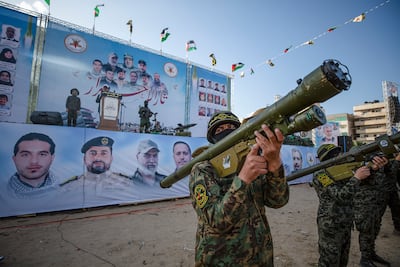Live updates: Follow the latest news on Israel-Palestine
If the thousands of Israeli troops massed around Gaza's border invade the Palestinian enclave, they will be met by members of a group even more militant than the Hamas movement that started the war.
They belong to the Palestinian Islamic Jihad, a close-knit group seen as one of the most lethal proxies of Iran in the Middle East.
The Israel-Gaza war broke out last Saturday when Hamas mounted a surprise ground and rocket attack on numerous Israeli targets.
Militants killed hundreds of people, mostly civilians, and took scores of hostages back to Gaza.
This drew massive Israeli retaliation against the enclave, with strikes killing more than 1,000 people, including many civilians. Now the prospect of a ground invasion looms.
Other pro-Iranian groups, mainly Hezbollah’s Shiite guerrillas, could enter the war, although both Israel and Iran have signalled their aversion to widening the conflict.

A few hours after Hamas’s fighters crossed a border fence into Israeli-held territory on Saturday, Islamic Jihad fighters joined them, said Marwan Shehadeh, a prominent Jordanian scholar who specialises in militant movements.
Mr Shehadeh said Iranian training for the two militant groups – whether directly or indirectly through Hezbollah – was crucial in building up intelligence-gathering capacity for the operation.
Despite ideological and political differences, Islamic Jihad has traditionally deferred to Hamas in military matters, he said.
This became more so after the assassination by Israel of many Islamic Jihad commanders, and even junior cadres, in Gaza and elsewhere over the last two years.
Meanwhile, Hamas gave the impression that it is more interested in improving its administration over Gaza than in attacking Israel, a diversionary tactic that appears to have fooled the Israelis, Mr Shehadeh said.
“No bullet is fired from Gaza without Hamas’s knowledge,” he said.
The two groups, however, differ on religious doctrine. While they are both made up of Sunnis, Islamic Jihad is more amenable to Iran’s Shiite proselytisation.
There are even rumours that Palestinian Islamic Jihad leader Ziyad Nakhaleh has converted to Shia Islam, Mr Shehadeh said.
Politically, Hamas is seen as more pragmatic on possible dealings with Israel. It has also maintained open channels with Arab countries. especially Egypt, Jordan and Qatar, the main funder of Hamas.

Links to Iran and Syria
When it comes to dealing with Iran, Hamas is more independent, said Mr Shehadeh, pointing out its funding from Qatar and a Muslim Brotherhood network of donors.
In contrast, Islamic Jihad relies solely on Iran for money, he said.
The differences between the two groups, said Mr Shehadeh, has been minimised by the current threat of an Israeli advance into Gaza.
“In these circumstances, the relationship with Iran is especially useful,” he said.
Islamic Jihad is estimated to number 9,000 fighters, according to the American-Israel Public Affairs Committee – about a quarter of the estimated strength of Hamas.

In a statement on the Islamic Jihad website, the group's leader Mr Nakhaleh said that it had taken 30 people hostage in the operation.
This forced Israel “to beg for help from the United States, the centre of evil in the world”, said the Palestinian Islamic Jihad leader.
Such anti-US rhetoric is similar to that of Iran's Ayatollah Ruhollah Khomeini, who called America “absolute evil.”
Islamic Jihad founder Fathi Al Shiqaqi was a huge admirer of Mr Khomeini, who was the first supreme leader of Iran from 1979 until his death in 1989.
The Islamic Jihad founder was assassinated by Israeli intelligence agency Mossad in Malta in 1995.
A former Islamic Jihad member says the group has gained additional expertise fighting for Syria's President Bashar Al Assad in his country's civil war.
Hamas pulled out of Syria in 2012, a year after the conflict started.
Islamic Jihad units were commanded by Hezbollah, and cadres were frequently flown to Tehran from Damascus and the northern Syrian city of Aleppo for training in Iran, said the ex-fighter, who is living at a Palestinian camp near Amman.
“They are the Palestinian Hezbollah,” he said.


